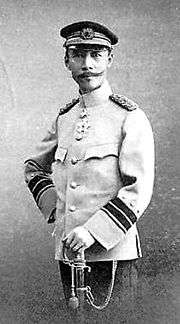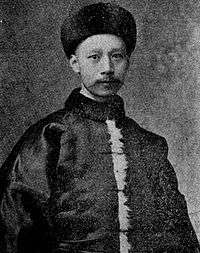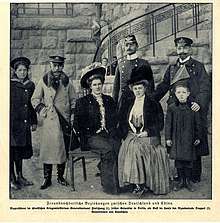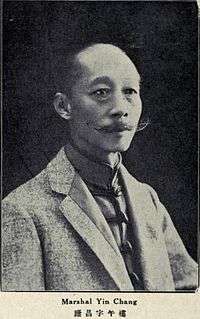Yinchang
Yin Chang or In-ch'ang (simplified Chinese: 荫昌; traditional Chinese: 廕昌; pinyin: Yìnchāng; 1859[1]–1928) was a military official, ambassador to Germany, and educational reformer in the Qing Dynasty and the Republic of China. He was appointed the nation's first Minister of War in the late Qing Dynasty. Later, he also became the military Chief of Staff in the Beiyang Government. He was ethnic Manchu, and his family belonged to the Plain White Banner Clan of the Manchu Military Organization (滿洲正白旗); he held the title of Prince of that clan; at court he was addressed as Wu-lou.[2]
Yinchang | |
|---|---|
廕昌 | |
 | |
| 1st Minister of War of the Great Qing | |
| In office 1910–1911 | |
| Monarch | Xuantong Emperor |
| Preceded by | Position established |
| Personal details | |
| Born | 1859 |
| Died | 1928 Beijing, |
| Military service | |
| Branch/service | |
| Rank | Marshal |
| Commands | Commander-in-Chief of the Imperial forces |
| Battles/wars | Xinhai Revolution |
Biography
In the Qing Dynasty


Originally Yin Chang was a student of the Guozijian, and by 1872 he was studying German at the Tongwen Guan, Beijing. In 1877 he was sent to Germany as an attaché to the Chinese Legation in Berlin. During his stay in Germany he studied military science at the same time as Wilhelm II and formed an association with the Krupp family. (He later married a German woman, with whom he had a daughter.) In 1884 he returned to China and was appointed to the Tientsin Naval Academy;[3] by December of that year he served as translator for the German military envoy to the Emperor.[4][5][6]
In June 1885 Yin Chang was appointed an instructor in military science at the Tientsin Military Academy (天津武備學堂), introducing the study of German military techniques taught by German officers. The following year he was promoted to be superintendent of the academy. The President of the Republic of China Feng Guozhang was a student under his direction. In 1898, when Prince Heinrich of Prussia and his naval squadron came to China, Yin Chang negotiated German claims on the region of Kiaochow and the port of Tsingtao and had Prince Heinrich presented at court. In winter 1899, he headed the negotiations with Germany for railway and mining rights in Shandong (山東路礦章程) and the concession in Tsingtao. These negotiations became part of the Boxer Protocol, which was signed September 7, 1901, in Beijing.[7] These terms were later integrated into the Tientsin Protocol, which in 1918 became part of the peace treaty with Germany that ended World War I.[8] Also in 1901 Yin Chang was named Lieutenant-General commanding the Plain White Banner Garrison (正白旗漢軍副都統).[4][5][6]
It is said that during the Boxer Rebellion, when the troops of the Eight-Nation Alliance stormed Beijing to relieve the besieged Legations, Yin Chang, with his German-equipped soldiers, escorted the Emperor and the Empress Dowager Cixi to safe passage through the back gates of the Forbidden City into the safety of Shaanxi Province, where the foreigners could not reach her. In August 1901 he was appointed the Chinese Ambassador to Germany (Berlin).[9] In September 1901, by Imperial Edict,[10] Yin Chang was charged with accompanying Zaifeng, Prince Chun to Germany with the special mission to convey China's regret to Kaiser Wilhelm II for the murder of Baron Clemens von Ketteler during the Boxer Rebellion. The mission proved an unexpected success, and Prince Chun was eagerly greeted by crowds[11] The Kaiser accorded Prince Chun a splendid reception, which included inviting him to review the military maneuvers of 50,000 troops in Danzig [12] The international press covered his every step.[13] During Ambassador Yin Chang's time in Germany, Kaiser Wilhelm II took a personal interest in the problems of modernizing a country’s military forces.[14] The Kaiser taught Yin Chang much about the organization, training, discipline, and equipment of a modern army. Also during this time, Yin Chang was sent as ambassador to the Netherlands for a term. Back in Germany he arranged a state visit to China for Prince Adalbert of Prussia.
In 1905 he was recalled to China and was appointed the director of the Nobles' College (貴冑學堂總辦) in Beijing.[15] That same year he changed the traditional uniforms of the Chinese Army to uniforms modeled on those of the German Army.[16] At the same time, he ordered arms and ammunition from Krupp.[17] Yin Chang was one of the reformers who abolished the Imperial Examination in the effort to modernize Chinese education. This had far-reaching effects. Supplanting the Confucian classics opened the curriculum to the disciplines of the sciences and the humanities. Instead of aiming only for civil service appointments, students could now pursue their own interests and choose a profession, including the military. In September 1906 Yin Chang became Commander-in-Chief in Jiangbei (江北提督), and two months later, became Army Chief of Staff(陸軍部右侍郎). By September 1908 he was reappointed as Chinese Ambassador to Germany, but because of the fall military maneuvers in Anhwei and the death of the Emperor and of the Dowager Empress Cixi, he did not proceed to his post until Spring 1909. In 1910 Yin Chang was recalled to China to take the position acting President of the Board of War (陸軍部尚書).[4][18][19]
In the Xinhai Revolution and the Beiyang Government

In September[20] In 1910 Yin Chang was the Chief of Staff of all the Army divisions stationed in the vicinity of Beijing (訓練近畿陸軍各鎮大臣). Three months later, Yin Chang was appointed the first Minister of War in Prince Qing's Cabinet and consolidated the different branches of the military under his aegis. As Minister of War Yin Chang set out to achieve three objectives: 1) greater efficiency and economy in his ministry; 2) improvement to the military profession; 3) establishing a national chain of command for the military under the ministry. To instill a sense of professionalism he ordered all officers to wear uniforms at work. They also had to use military salutes on all occasions, official and civil. He did succeed in fostering a sense of patriotism throughout the Army as evidenced by a new respect and pride in the military profession.[21]
As the first Minister of War, Yin Chang was dedicated to educating the population of the country with general information about the military and the function and responsibilities of the army. He wanted to create a sense of patriotism by making the military a subject in schools, and the Imperial University added a military course to the curriculum. He required military drills and instruction as well as physical education included in the curriculum of middle and primary schools. Yin Chang’s efforts at reform encountered opposition from traditionalists, officials protecting their interests and sinecures, and provincial governments guarding their power. The Manchu Dynasty fell before the results of his work became evident. Different aspects of it were taken up by succeeding regimes for their own purposes.[22]
In May 1911 Yin Chang attained the rank of full general but also remained in the Cabinet. On the outbreak of the Xinhai Revolution in August of that year, General Yin Chang was appointed Commander-in-Chief of the Imperial forces and sent to quell the revolutionary army in Hubei.[23] However, his command of the army of the Qing Dynasty was countermanded by Prime Minister Yuan Shikai as soon as he reached the front together with his troops, thus leaving vital weapons and ammunition factories unprotected.[24] On his return to Beijing he was appointed Chief of the General Staff but resigned from his post as Yuan established his Cabinet.[4][18][25] It has been speculated that had Marshal Yin Chang been allowed to remain in Hubeii, the revolution might not have been a success.[26]
When the monarchy was abolished in 1912, Yin Chang resigned his post in the cabinet on the Day of the Princes, when one Mongol and eight Manchu princes collectively resigned.[27] After the establishment of the Republic of China, Yin Chang was invited to be the High Diplomatic Advisor of the Ministry of Foreign Affairs.[28] Even while serving as an official of the Republic, as a private citizen, with a relationship to Prince Chun, Yin Chang maintained his loyalty to the deposed Emperor, Pu-Yi.[29] In December 1912 Yin Chang was reappointed a Full General and was appointed to be Military Chief of Staff to President Yuan Shikai (總統府軍事處處長),[30] a position he resigned in 1915 when Yuan Shikai declared himself Emperor.[31] In December 1917 he became Commander in Chief of the General Staff for the Republic. In January 1919 he was reappointed to Military Chief of Staff to the President by Xu Shichang, a position he held for succeeding presidents Li Yuan-hung, Feng Kuo-chang, and Hau Shih-chang.[32] In the last years of his life he served as Military Adviser to Generalissimo Chiang Kai-shek. In October 1923 he received the title of Marshal with "Zhuang Wei" (莊威將軍). He died in Beijing in 1928.[4][18][25]
References
- According to Xu(main ed.) (2007), p.2209. Who's Who in China 3rd ed. (1925), p.938. wrote "1860".
- Arthur Hammell, ed. Eminent Chinese of the Ch'ing Period. 2 vols.
- "Yin Chang Minister to Germany". New York Times. August 14, 1901.
- Xu (main ed.) (2007), p.2209.
- Who's Who in China 3rd ed. (1925), p.938.
- Gaimusyô Zyôhôbu (1928), p.4.
- Treaties and Agreements with and Concerning China, 1894-1919 (Vol. 1 ed.). New York: Oxford University Press. 1921.
- U.S. Congress Senate Committee on Foreign Relations, 66th Congress. “Treaty of Versailles, Part 1,” p. 1090. U.S. Govt. Printing Office, 1919.
- "Yin Chang Minister to Germany". London Times. August 14, 1901.
- Rockhill, William W. (1901). Report: Boxer Protocol, Annex No. 2, 57th Congress, 1st Session. Washington, DC: Government Printing Office.
- London Times, "The Sketch: A Journal of the Arts," Sept. 4, 1901.
- Japan Daily Mail, Sept. 18, 1901, Vol. 36, p. 303.
- Pu-Yi, Aisin-Gioro, From Emperor to Citizen: The Autobiography of Aisin-Gioro, Pu-Yi. Beijing: Foreign Language Press, 1989.
- Afflerbach, Holger, Falkenhayn: Politische Denken ang Handeln im Kaiserreich. Oldenburg: Wissenschaft verlag, 1994.
- “Yin Chang interview: The Defiant Chinese.” The Christian Register, March 22, 1906. The Christian Register Association, Boston, Mass.
- Reilley, Ralph (1912). Wartime Changes to the German Field Uniform.
- Morrison, G. E. The Correspondence of G. E. Morrison, 1895-1912. Page 615
- Who's Who in China 3rd ed. (1925), p.939.
- Gaimusyô Zyôhôbu (1928), pp.4-5.
- According to Xu(main ed.) (2007), p. 2209. Who's Who in China 3rd ed. (1925), p. 938.
- Edmund S.K. Fung, The Military Dimension of the Chinese Revolution: The New Army and Its Role in the Revolution of 1911. Vancouver: University of British Columbia Press, 1980, pp. 47-53.
- Fung, The Military Dimension of the Chinese Revolution.
- “The Revolution Starts,” San Francisco Call, Oct. 25, 1911.
- Prescott Clarke, A Research Guide to China Coast Newspapers 1822-1911. Harvard East Asian Monographs, ed. Frank H.H. King. Harvard University Press
- Gaimusyô Zyôhôbu (1928), p. 5.
- According to Who's Who in China 3rd ed. (1925), p.939
- P. H. Kent, The Passing of the Manchus. London: Edward Arnold (1912).
- Erik Nystrom, Det Nya Kina [The New China]. Stockholm: P. A. Norstedt & Sons (1913). Book from the collection of Marshal Yinchang's great-grandson, Alexander Ruas, Stockholm.
- Pu-Yi, Aisin-Gioro, From Emperor to Citizen, p. 120.
- Journal of the American Asiatic Association, Vol. 12, 1912
- “Change and Reaction: Resistance, Change, New Talent. Chicago Commerce, Vol. 2, 1915.
- Howard Boorman, ed. Biographical Dictionary of Republican China. 4 vols.
Footnotes
- Xu Youchun (徐友春) (main ed.) (2007). Unabridged Biographical Dictionary of the Republic, Revised and Enlarged Version (民国人物大辞典 增订版). Hebei People's Press (Hebei Renmin Chubanshe; 河北人民出版社). ISBN 978-7-202-03014-1.
- Gaimusyô Zyôhôbu [Intelligence Department of Ministry for Foreign Affairs, Japan] (1928). Gendai Sinazin Meikan Kaitei [The Directory of Current Chinese, revised edition]. Tôa Dôbunkai Tyôsa Hensyûbu [Researching and Compilation Department of Toua Doubunkai].
- Who's Who in China 3rd ed. The China Weekly Review (Shanghai), 1925.